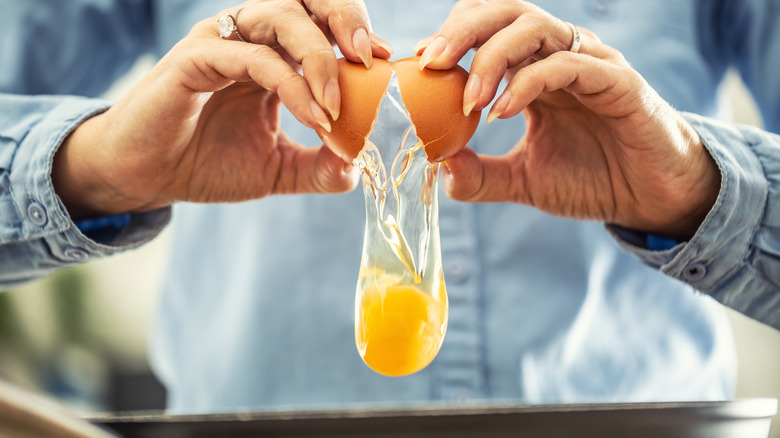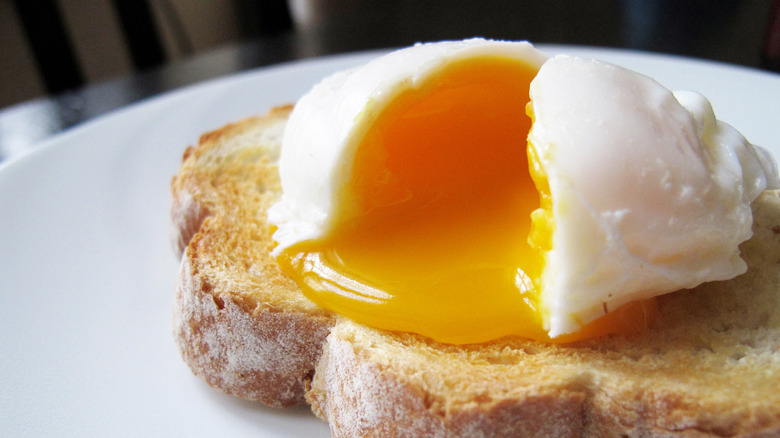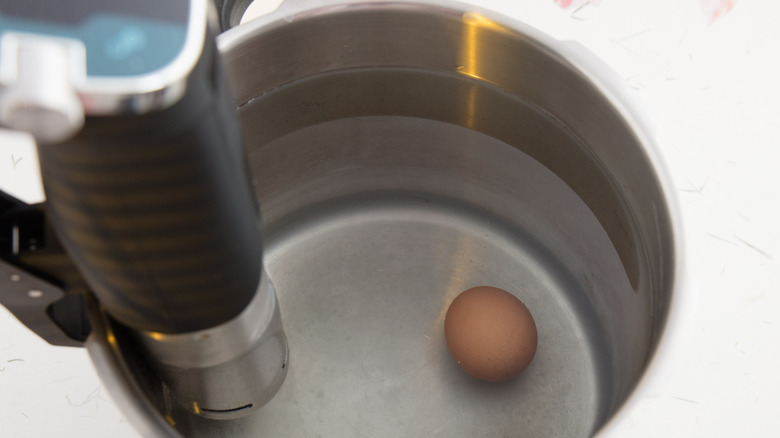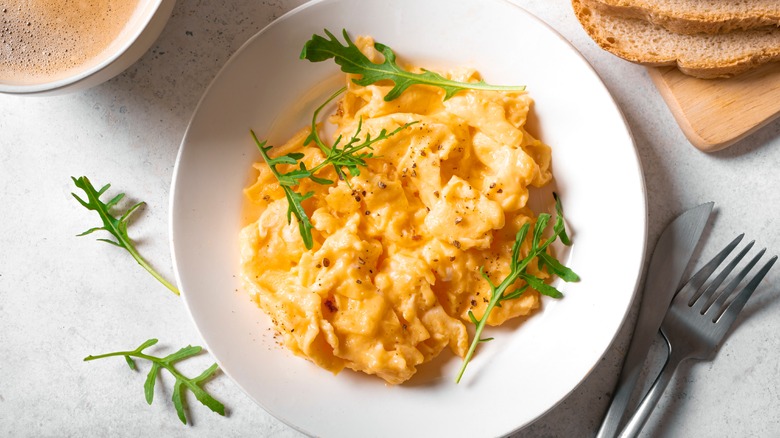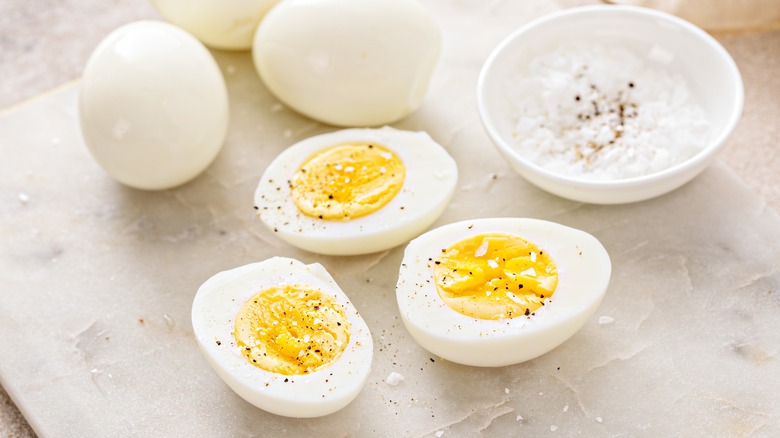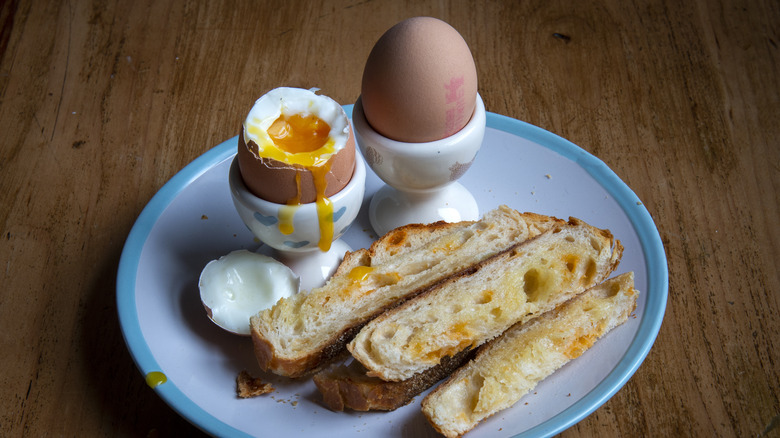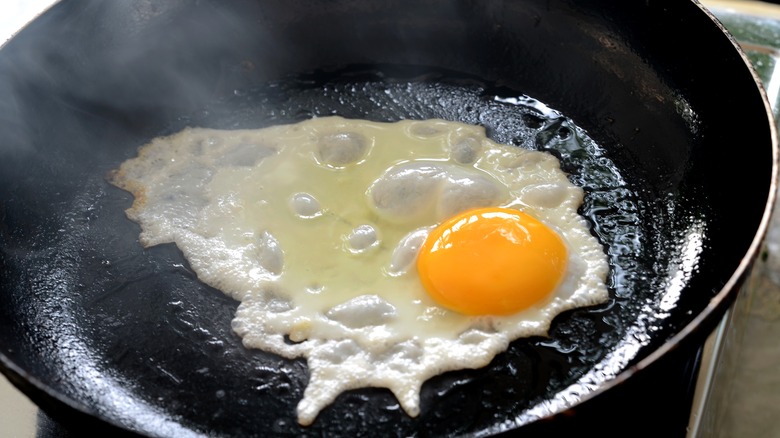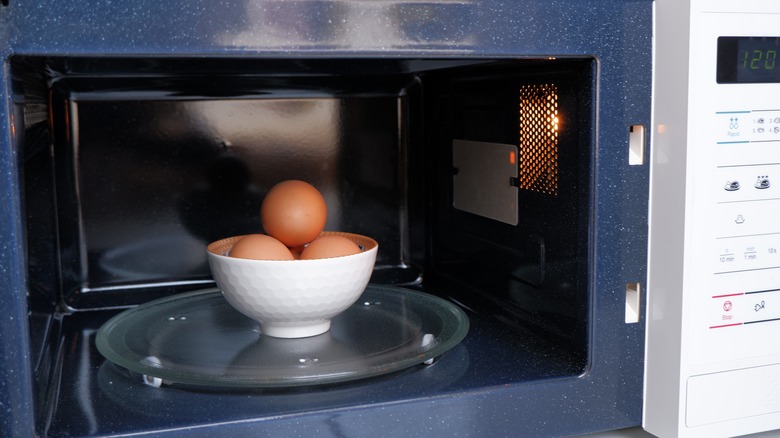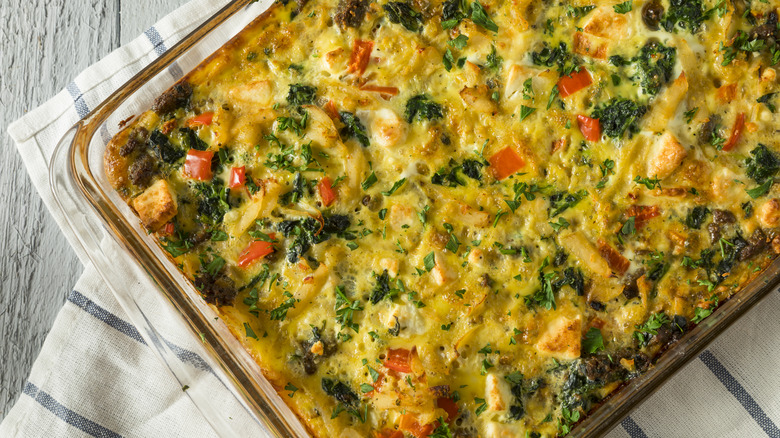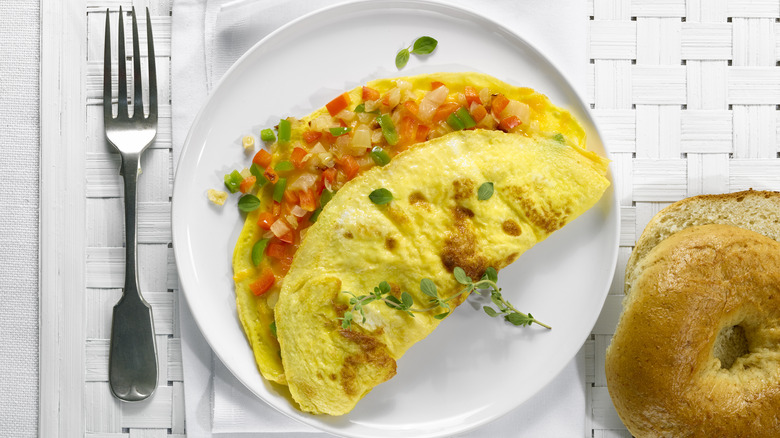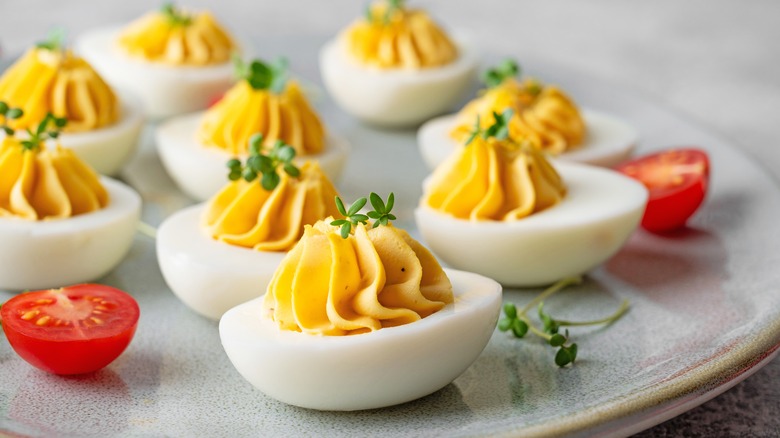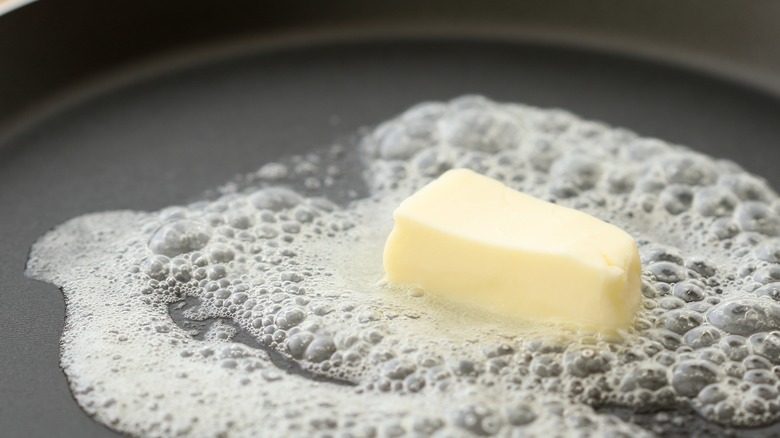The 5 Healthiest And 7 Unhealthiest Ways To Cook Eggs
Eggs — completely on their own, before you factor in any additional ingredients or cooking methods — come with a bevy of health benefits. Eggs are a low-calorie source of protein and come packed with nutrients like vitamin D, choline, lutein, and zeaxanthin. While you probably know vitamin D, if you're not as familiar with these other nutrients, choline supports metabolism and liver health, and lutein and zeaxanthin promote eye health and reduce the risk of eye health issues in older adults. Likewise, studies have found that some individuals who eat eggs everyday are at a lower risk for heart disease and stroke.
However, for all this eggy goodness, eggs have also received a pretty bad health rap for one particular thing: cholesterol. Just one egg can contain more than half of your daily recommended cholesterol, per prior federal guidelines — and, let's be real, most of us aren't just eating one egg. Too much cholesterol, and you could be at risk for heart disease and stroke.
That said, the experts do generally agree that eggs are a healthy part of a balanced diet, so long as you're not already at risk for heart issues or have high cholesterol, and so long as you're cooking your eggs properly. The wrong prep choices can turn your perfectly healthy egg into a less-than-healthy breakfast choice. Here are the some of the healthiest options to consider and some of the unhealthiest you may want to reconsider.
Healthy: Poaching
Poaching an egg requires simply cooking a cracked egg in simmering water, for a short amount of time, until the egg white cooks around the runny yolk. Poached eggs are a delicious addition to toast, salad, pastas, and more, and they also come with the benefit of being one of the healthiest types of eggs you can eat, based on cooking style alone.
This is the case for several reasons. For one, poaching does not require you to cook the egg at a (relatively) high heat, for a long period of time. The longer and hotter you cook an egg, the fewer valuable nutrients they contain. Additionally, poaching does not require you to add any fatty oils or similar ingredients, and you really don't even need to add any extra ingredients at all, to enjoy a poached egg. A little salt and pepper go a long way (though watch the salt if you're keeping an eye on your sodium). If you're poaching your eggs, though, just be sure to buy pasteurized eggs, as that will lower the risk of food-borne illness that usually comes with runny yolks.
Healthy: Sous vide
In a very similar manner, sous vide cooking is likewise a healthy option for cooking eggs, due to the low temperature required by the cooking process, which maintains the eggs' nutrient contents, as well as the fact that you don't need to add any other ingredients to the eggs, in order for this cooking process to be successful.
It's worth noting that there are several ways to go about sous vide cooking an egg, though, and some methods are healthier than others. Some methods require you to cook your eggs longer and at a higher temperature, while others require you to cook your eggs for a shorter time period and/or at a lower temperature. To retain the most nutrients, it's vital to find the right balance between a low temperature and a short cooking time. If you have to choose between optimum temperature and cooking time, go for the shorter cooking time at a higher temp, which has been shown to be the best option for retaining nutrients.
Healthy: Scrambling
In general, scrambling your morning eggs is a great option. Scrambling doesn't require a long cooking time, preserving some of those key nutrients, and scrambling is also much easier for most home cooks, when compared to poaching, which can take some practice, and sous vide, which might require expensive, fancy equipment.
However, scrambling your egg can quickly fall into unhealthy territory. For example, have you ever scrambled a single egg? After you plate it up, it doesn't really look like you have much egg there. Most home cooks and even restaurants serve scrambled eggs in multiples. This can be a health risk for some people. For those not at risk, with heart disease risks or high cholesterol, one to two eggs per day is the recommended maximum. For those with risks, it's advised you limit your weekly total to four to five eggs.
There's also, of course, the fact that, most of the time, if you're scrambling an egg, you're adding extra fat to the pan, via butter or oil. Likewise, many home cooks whisk milk or cream into their scrambled eggs, which further increases the fat and caloric content (however, the milk can be easily substituted with water, for similarly fluffy scrambled eggs and no extra fat or calories). So, while scrambling is a perfectly healthy way of cooking an egg, take care to keep it that way, by not eating too many scrambled eggs in one sitting, or by adding excess fat to your eggs.
Healthy: Boiling
While it's true that studies have found that boiling an egg reduces the amount of xanthophylls in an egg more so than frying or microwaving an egg, many still agree that the many benefits of boiled eggs outweigh this slight downside. For example, like poaching or sous vide cooking an egg, boiling an egg requires you to add no extra ingredients, such as fats or oils, to the cooking process.
After your egg is boiled, peel it, add some salt and pepper (go easy on the salt) and you have a perfectly healthy breakfast or snack. Additionally, if you hard boil your egg, you'll find that you've reduced the risk of food poisoning that comes with eating runny, under-cooked eggs. Likewise, when comparing boiled eggs to poached eggs, the former has slightly more choline than the latter — a nutrient that helps support metabolism and liver health.
So, if you want to boil an egg, go right ahead. You can get your xanthophylls elsewhere, such as via green leafy vegetables, corn, pumpkins, papayas, peppers, and certain seafood and mushrooms.
Healthy: Soft-cooking
Soft-cooked, or soft-boiled, eggs are healthy for many of the same reasons that hard-cooked or hard-boiled eggs are healthy. You don't need any other ingredients for this cooking process and can enjoy all the health benefits of your egg with just some salt and pepper, if desired. Studies, per the National Library of Medicine, have also found that there are no nutritional differences between hard-boiled and soft-boiled eggs.
The main difference between soft-cooked and hard-cooked eggs is that hard-cooked eggs are literally cooked until the yolk is hard, whereas the yolk in a soft-cooked egg is still a little runny. Due to this, soft-cooked eggs do come with a slightly higher risk of food poisoning than hard-cooked eggs. For the lowest food poisoning risk possible, while still undercooking your eggs and getting that runny yolk, the U.S. Department of Agriculture recommends shopping for in-shell pasteurized eggs. When a commercial plant or farm pasteurizes its eggs, they basically heat the egg in warm water, to a degree that it kills any bacteria, without cooking the egg.
Unhealthy: Frying
But let's get into the unhealthy cooking methods that you might choose for your eggs. Note that, while these "unhealthy" methods can certainly be enjoyed as part of a balanced diet (like just about any other food), when compared to the healthier egg-cooking methods, these unhealthy options may leave a lot to be desired.
Fried eggs are often cooked at a high temperature, in a pan of hot oil or fat. The high temperature can reduce the amount of nutrients in the eggs, such as certain antioxidants. Frying eggs can specifically reduce the amount of vitamin D in the egg by nearly 20%, according to a study in the National Library of Medicine. Additionally, when eggs are cooked at a high temperature, the cholesterol in the egg may become even more dangerous, as the cholesterol becomes oxidized.
Then, you have to consider that the added oil or fat needed to fry the egg comes with its own health concerns. Frying eggs in butter can add saturated fat and unnecessary calories to your breakfast, the former of which is even more concerning if you are already trying to improve your heart health. Like the cholesterol in the egg, the fat that you are frying the egg in can likewise oxidize, which can lead to bodily inflammation.
Unhealthy: Microwaving
First things first, if you are thinking of microwaving an egg, refrain from popping the entire in-shell egg in the microwave, hoping you wiill get a hard-boiled or soft-boiled egg in mere minutes, without the need to boil a pot of water. While, sure, you will cook that egg lightning-fast, it will also probably explode all over the microwave or all over you, sending shell and yolk flying. Not only does that create a nasty mess, but it could also create some nasty burns, as well.
Less from a safety perspective and more for a health perspective, though, the high heat a microwave uses can reduce the nutrients in the egg, just like other high-heat cooking methods. That said, because microwaving requires less time than other high-heat cooking methods, when you compare microwaving an egg to frying an egg, you can expect to retain overall more B vitamins, vitamin C, and folic acid when microwaving. Overall, if you do want to give microwaving an egg a try, risks and health concerns aside, opt to simply crack your egg into a greased, microwave-safe bowl, whisk the egg, and cook the mixture for about a minute, or until the egg is set.
Unhealthy: Baking
We are not just talking about baking eggs in a cake or similar item. Whether you are baking eggs on a sheet pan as part of a sheet pan dinner, in a quiche or egg casserole, or simply in ramekins with a handful of other ingredients for an easy breakfast, baked eggs trend unhealthy due to the long, hot cooking method that reduces the overall nutrient content. One study in the National Library of Medicine found that baking eggs for 40 minutes can reduce the eggs' vitamin D content by up to more than 60%, as compared to the under 20% that's lost when you fry or boil an egg.
It is also worth noting that, most of the time, baked eggs aren't baked on their own, with no other ingredients. While quiches and similar baked egg dishes can be healthful, many often include less-than-healthful ingredients that can derail certain health goals. For example, egg casseroles are often combined with lots of other breakfast favorites — like cheese, sausage, and bacon — that really and quickly negatively impact the casserole's fat and sodium content. Additionally, quiches add on extra calories, fat, and sodium through a crust, dairy, and cheese. If you do want to make a baked egg dish, regardless of the lost nutrients, but as healthily as possible, go crust-less and aim for add-ins like vegetables and lean meats.
Unhealthy: As an omelet
Much like quiches and casseroles, omelets are an egg-based dish that can find new life as a healthy breakfast option, but that are, more often than not, stuck in the unhealthy camp due to the choices made during the cooking process. For example, while omelets are cooked similarly to scrambled eggs and require less nutrient-zapping heat than a fried egg, omelets, also like scrambled eggs, still require some cooking oil or fat and also usually require more than the recommended one egg. Then, you start adding in the fillings — cheese, sausage, potatoes, bacon — and the calories, fat, and sodium soar.
Order an omelet out at a restaurant and things get even worse, with omelets at major chains boasting calories and milligrams of sodium measuring in the thousands. For a healthier omelet, opt to cook with olive oil rather than butter, use fewer eggs or egg whites, and choose fillings with care, focusing on vegetables and lean sources of protein.
Unhealthy: Deviled
You are not likely going to find this egg preparation method making an appearance at breakfast time, but it does pop up quite a lot at summer picnics and as a part of holiday spreads, especially in the southern United States. A deviled egg is made by hard-boiling your eggs, then peeling them and carefully slicing them in half, removing the yolks and setting the halved whites aside. The yolks are then mixed with mayonnaise, mustard, and seasonings and toppings that range from super-simple to elaborate.
Unfortunately, while hard-boiled eggs are relatively healthy, turning those hard-boiled eggs into deviled eggs does negate some of the health benefits. One of the best things about hard-boiled eggs is that they can be eaten as is, with no need for extra fats or other less-than-healthful ingredients. Deviled eggs, however, pack in the sodium, calories, fat, and saturated fat via the mayonnaise. A cup of mayonnaise contains nearly half your daily recommended sodium, so if you do plan on indulging in some deviled eggs, do your best to not eat the entire tray (which is easier said than done — they are tasty!). You can also find a recipe that replaces a portion of the mayonnaise with something else, like non-fat Greek yogurt.
Unhealthy: In butter or animal fat
There are many instances wherein you might cook an egg in butter or animal fat — scrambling, frying, and baking among them. However, no matter what cooking method you choose, healthy or unhealthy, you're going to automatically negatively impact your breakfast's healthiness by incorporating butter and animal fats into the mix.
For example, butter is both a high-calorie and high-fat (including saturated fat) ingredient, which means that it is not ideal for those either watching their caloric intake or trying to make heart-healthier choices. For healthy adults, it is advised that you eat less than a tablespoon of butter per day. Before adding that tablespoon of butter to your pan for scrambled eggs, consider where you might be eating butter otherwise, such as spread on your toast with jam, or slathered onto your corn on the cob at dinner.
Bacon grease is another animal fat that is often used for cooking eggs, but it likewise comes with its downsides. While it may seem natural to, while you're cooking breakfast, reserve that bacon fat and use its flavorful goodness for cooking a fried egg, bacon fat does contain more cholesterol than other options, like olive oil. When you are already getting a hefty amount of cholesterol from your eggs, do you really want to add any more?
Unhealthy: In an oil that oxidizes easily
Lastly, if you choose an egg-cooking method that utilizes a cooking oil, try to avoid oils that oxidize easily. When an oil oxidizes, it not only changes the oil's (and thus your food's) flavor, but it also can cause the oil to produce potentially health-harming compounds.
Some of the oils that are the least likely to oxidize include olive oil, which is about 50 times less likely to oxidize than vegetables oils, including sunflower and corn oil. Coconut oil is also less likely to oxidize than sunflower oil, and it's even more resistant to oxidation than olive oil. Coconut oil is also a good choice for high heat cooking, as it has a high smoke point. Specifically look for refined coconut oil if you plan on using it for high heat cooking, like when frying eggs, as it has a higher smoke point than unrefined coconut oil.
